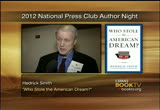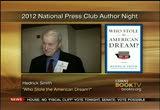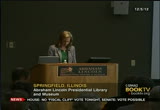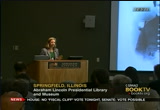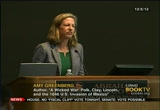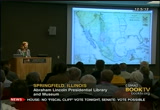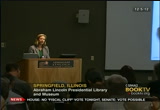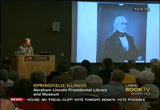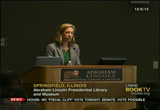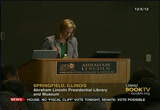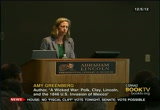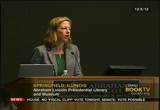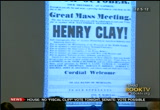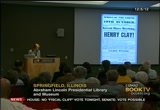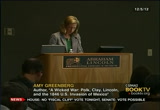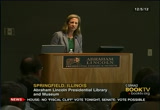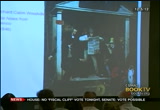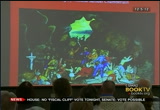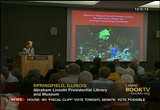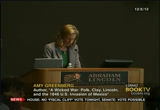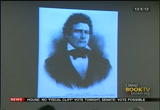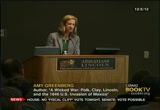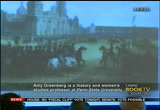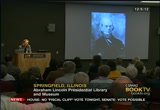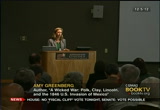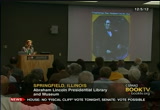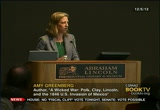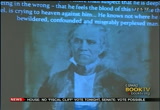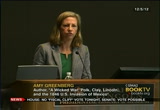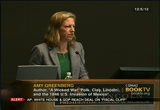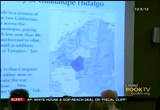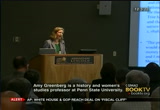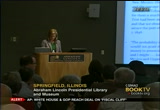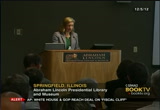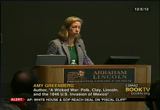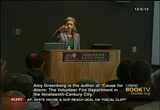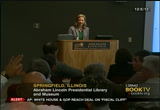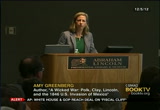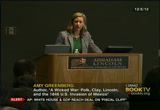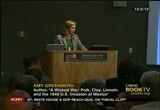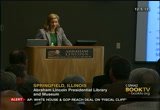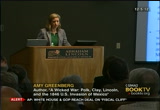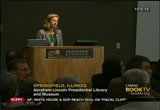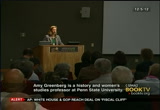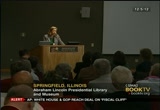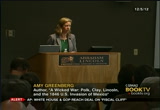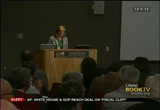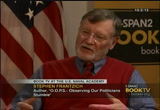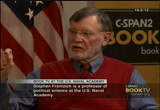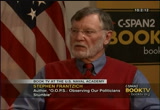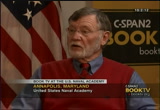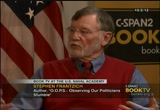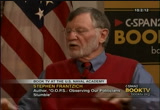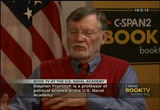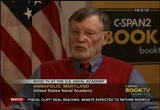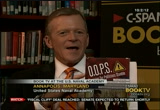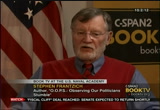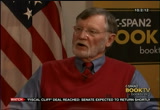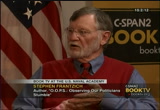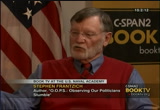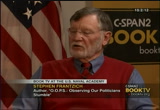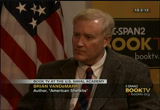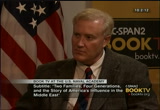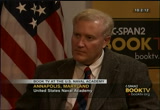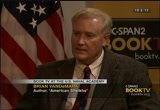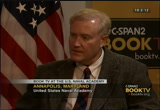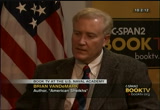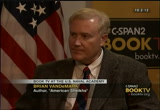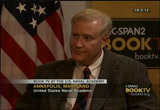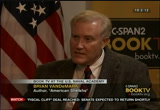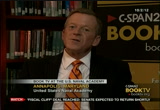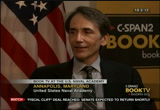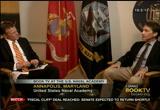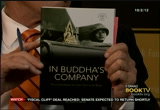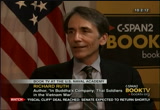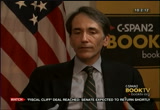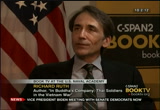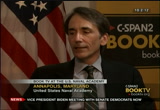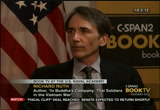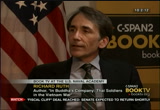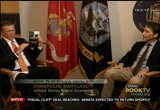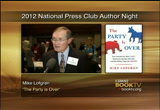tv Book TV CSPAN December 31, 2012 8:30pm-10:00pm EST
8:30 pm
title, who stole the mac and dream? i start with the title the dream at risk. there was a problem. everybody knew there was a problem for the middle-class but only as i got into it i kept discovering more and more things and i realized this was not impersonal market forces. this is not technology. this was not globalization. what was happening was american politics and american economics were working against the middle-class. people do this. we decided it. if you look at other countries like germany, they have done better training and so world and their companies and making money so a lot of things we heard that were not impossible, not possible in america were actually happening in germany and their wages have gone up five times faster than ours. there something wrong inside the american political and economic system and that is what this book is about. >> who stole the american dream, hedrick smith is the author. thank you for being on booktv.
8:32 pm
and mountain memoirs, he writes frankly about the experiences he had, the good and the bad making for good reading. what he talk about late in life was his role in the u.s.-mexico war in 1846, and grant said, you know, at the time, "i do not think there was ever a more wicked war than that waged on the united states by mexico so i thought at the time as a youngster only i had not moral courage enough to resign." grant, of course, in the war was a young lieutenant, and i found this is really moving quote, and that's why it's the title. the fact of the matter is grant was not alone in thinking that the u.s. invasion of mexico was somehow wicked. one thing that i talked about in the book and i'll talk about tonight is the evolution of the american public in the course of the u.s.-mexico war, not a long war by any means from being really enthuse yays tix and in favor of invading mexico to
8:33 pm
largely turning in the war, and i see the u.s. mexico war as the moment of america's first anti-war movement actually coming into being so there was anti-war sentiments during the revolution and certainly in the war of 1812, but that sentiment was limited. what you see happening in 1847 is a consensus, really, across the board. people from different regions of the country, soldiers in the field, officers, politicians, all deciding that a war that was being more or less successfully waged in another country was wrong and actually protesting that war so i think this is a really interesting moment in american history, and it takes place in a war that people really don't know much about. the u.s.-mexico war, people don't write about it a lot. there's not a big place for it in the big historical imagination of americans. there's a number of reasons for that. it's confused with the texas
8:34 pm
revolution that happened eight years before or ignored all together. when historians talk about the u.s.-mexico war, they tend to think about the war in relationship to the civil war, and they narrate the u.s.-mexico war as sort of the first stop on the road to secession arguing that the land that came from mexico apt the close of the war is what really caused sectionalism to heat up, and, n., that's all true. you can look at the war as the moment that the civil war was inevitable, if you want to look at it that way, or on its own terms which is what i tried to do in this book. what i was interested in doing when i wrote this book was to show the impact of the war on individuals and on families. the u.s. mexico war had the highest mortality rate of any american war. 15% of soldiers serving in mexico for the united states died. 78,000 troops served in mexico,
8:35 pm
and it was a war that had a big impact on people at home. i reallimented to write a narrative that explored how people were impacted and their families and people talked both in the war are abraham lincoln, making his first major political speech, one i found, actually, quite widely documented and discussed in newspapers. his first major vote in congress was condemning the war. lincoln's first political stance on the national stage is against the u.s.-mexico war. that's one person i talk about. another person is john jay harden. some of you may be familiar with. he's part of a very, very important family in jacksonville, and for a period of time he was the leading wig politician in illinois, not abraham lincoln, and it's only hair din's death in the war that some argue makes lincoln's path
8:36 pm
forward and road to the presidency possible because he was under the shadow of john before that happened. hardin's family is fascinating and deeply, deeply affected by the u.s. mexico war war. like most people, you probably don't know a lot about it. the north american invasion as it was known in mexico began when president polk sent troops into a disputed areas between the rio grand rivers with the intention of starting a war. polk wanted more. he was set on declaring war if the mexican army didn't rise. the day before he found out that mexicans crossed the river and killed 14 soldiers in the disputed area, polk said, you know, we have to declare war against mexico. the cabinet said we can't because they have not done anything. we sent 4,000 american troops
8:37 pm
down into land that mexico thinks is theirs, and we're waiting for something to happen. it has not happened. can't declare war yet. polk finds out an incident happened two weeks before. news traveled slowly then, and when polk got this incident that he needed, he went to congress on may 11th, 1846 stating, "mexico passed the boundary of the united states, invaded our territory, and shed american blood on american soil." this was a lie. everybody knew it was a lie. the wig party, the opposition party, abraham lincoln's party, everybody in the wig party knew, in fact, the land where the soldiers were sent was considered mexican rather than texas land. they write privately to each other after polk makes the statement that, well, the idea this is american soil that blood
8:38 pm
was shed on is pretty dubious, but the fact of the matter is everybody lines up, and they vote in favor of poke's declaration of war. it's not a declaration of war because polk is not asking congress to declare war, but that a war is going on, sent -- send support to the troops. the wigs are afraid of looking unpatriotic, suffering under the label of not being patriotic, and all 14 members of congress vote in declaring war in mexico, and that's how the war starts. it's short, 20 months total, and 16 months of those are actual fighting. as you'll hear today, it was not short enough for the american people. it was marked by a number of stunning military successes by the united states like the battle of buena vista where 5,000 american soldiers defeated an army between 15 and 20,000 soldiers. the numbers, the ratios in the
8:39 pm
battle is obviously quite astounding, but the fact of the matter is almost every battle of the u.s.-mexico war, troops greatly outnumbered u.s. troops, and, yet, the u.s. won every single military engagement in the war with the exception of the battle in california which americans prefer to think of as a squirmish rather than a battle. that doesn't really count other than that americans win every single battle. three theaters the war, and in the first stage of the war, zachary taylor secured northern mexico with key victories in 1846 in the first months of 1847. the second theater of war, general steven watts carney traveled west in kansas through new mexico conquering new mexico and all the way to california happening at about the same time. unfortunately, neither of these tremendous victories bring what polkments which is peace, and
8:40 pm
the securing of california and texas into the american union. mexico refuses to surrender despite the victory of taylor and carney and polk sends general winfield scott to invade central mexico, bombards vera cruz traveling through central mexico securing the capitol and the fall of 1847. in the eyes of the americans, it was a fore gone conclusion their side would win easy because most harbored racist beliefs on mexican men being that they were too lazy and cowardly to fight. now, point of fact, mexican troops fought very hard as you see in the really rare print. very, very few images of the war so it's great when you find one to get a sense of how they envision what's happening. mexico lost all of these battles, and ultimately lost the military side of the war because
8:41 pm
they had vastly inferior weapons, their leadership was terrible, mexico's government was in turmoil, they were broke, various battles where they are actually -- no money was even making it to the army to support itself, and because hostile native american trains in north of mexico had so ravaged northern mexico, little will to resist among the residents in the northern part of mexico. now, on the mexican side, most of the army was made up of conscripts who didn't fight as hard at others, but object u.s. side, most were vol -- volunteers. at the start of the war, it was so overwhelming, particularly in the midwest, that many, many more men volunteered to fight than could actually be taken in volunteer regimens so overwhelming enthusiasm for the war, and, in fact, the midwest
8:42 pm
provides the most troops fighting in mexico. people think it's the south. it isn't. missouri and illinois are the two states that provide the most troops that go to fight in mexico. nonetheless, support for the war was not universal at the beginning. here we have a campaign post r for henry clay, the wig nominee in 1844, and his opponent was james k. polk running on the platform of annexing texas, and expansionism in general. clay opposes annexing texas in 1844 because as you see from the poster, he believes it's resulting in war with mexico. i love the poster when i discovered it. it's from a campaign appearance in indiana. look at the lists why to support clay here in 1844, the first couple are really typical wig economic positions. the wigs generally are the party
8:43 pm
of economic development in the united states in the 1840s, but when you get down to the fourth reason, you can see are you for or against the annex asian of texas? are you for or against the assumption of texas debts? are you for or against an unjust and disgraceful war with mexico? then my favorite, for or against natural disgrace? this is in 1844. this is what wigs say if you don't volt for clay, you bring national disgrace on the country, and you'll be in a war with mexico. clearly, a lot of people could see the writing on the wall. in new england at the start of the war, anti-slavery sentiment was widespread and anti-war sentiments as well. early on in the war, the massachusetts house of representatives states that the war is immoral and they are going to oppose it, and a lot of new england intellectuals
8:44 pm
provide really trenched critiques of the war. people speak out against the war in strong terms. now, i think in opposition of the war was limited to new england, it would be interesting, but not that different from what happened in the war of 1812. what you see happen, though, is that over the course of the war, new england stops being the only place where people protest the war actively, and there's a national anti-war movement grow. there essentially four main grounds on which americans oppose the war. the first one, which you can see clearly in the poster, on the grounds of morality that this was an unjust war bringing national dishonor on the united states. congressman joshua giddings of ohio warned the house of representatives repeatedly that in order to be patriotic, people had to, quote, dpis sent from the aggressive, unholy, unjust war, and upon the murder of
8:45 pm
mention mexicans on their soil or robbing them of their country, i can take no part for now or after." he was strong in his opinions, but that was the kind of critique that you see certainly by march of 1847 when the united states bombarded the town of vera carney leading to the death of lots of civilians. there was a critique based on morality. the second grounds upon which people critique the war were on the grounds of slavery, and getting -- i just told you about, an abolitionist, but it was not just abolitionists or people in new central england ww issues of slavery being really important to the war. a lot of people felt like if the united states did, in fact, annex large portions of mexico, that would make slavery spread and make the slave power stronger. begin, it was not just people in new england with the view.
8:46 pm
consider for a moment this very popular print of the war. maybe some of you have seen this. when you first look at it, it's kind of a neat image of the power of newspapers in the 1840s. this is called "war news from mexico" by richard catten woodbill, a well-known and republicked artist at the time. first it looks like an image of people being inthursday yays tick of the war -- enthusiastic of the war, got news of the war in the newspapers, and, in fact, this was the first war where journalists were embedded with troops. basically, there were journalists traveling with the troops writing back story. it's the first war where people get immediate news about what's happening from a first hand accounts from journalists traveling with the troops. look at the image more closely. first of all, woodbill was from baltimore, not new england. notice how he places slaves up at the front and center of the image. i think what's bill's asking
8:47 pm
readers to think about the implications of slavery by putting them in front of the image, and at the very edge, there's a guy tossing a match into a barrel. this was suggesting, well, you know, what is mexico really going to do other than set off a fire storm? this is an image from baltimore about the war. another major critique of the war had to do with what people saw as the impact of service in mexico on the american character. people argued that the mexican war was making the american character worse, and, in fact, degrading american soldiers and turning them into the people that we really didn't want them to be. this critique became especially strong after reports of very bad behavior from american troops made it into u.s. newspapers, and i see that happening about the middle of 1847. particularly in northern mexico,
8:48 pm
the volunteers who i told you about behaved extremely badly. they murdered civilians in the streets. they raped mexican women. there were reports of entire villages burned down, and general zach ri taylor felt he couldn't control the volunteers who were under control of their own commanders from their own towns, and none of them abided by the kind of discipline that taylor expected and basically got from the regulars in the army. here's one image of a massacre of 25 mexican civilians by arkansas volunteers known, by the way, as the racken sackers in northern mexico in february of 1847. this was painted by a soldier from illinois who actually claimed to see this massacre happen. he didn't have to see it. it was reported all over the united states. the racken sackers were taking revenge on the people of mexico for the murders of one of their
8:49 pm
own, and this was a really widely reported incident, but by no means exceptional, and, in fact, a couple weeks after this happened, another ms kier was similar perpetrated by texas. when the american people read about this behavior, it helped turn them against the war. the st. louis republican was a newspaper that when it heard about the massacre, it initially claimed that it could not be true so they denied it. they said there's rumors it's not true, but once the newspaper got verification of it, it actually wrote to all readers saying let us no longer complain about mexican bar bare disputed, poor and degraded as she is, no cruel perpetrated can excel the work of yesterday committed by our solders. finally, the fourth reason, and,
8:50 pm
perhaps, the most important reason why the antiwar movement spreads sen -- and is a force in american is basically racism. a lot of americans felt like association with mexicans wouldn't just corrupt american manhood but had the potential of degrading the united states all together by watering down what americans believed to be their anglo-saxon blood. south carolina's greatest orator and intellectual john c. calhoun, a believer and the needs of slavery in society was an active opponent of the war with mexico because he thought that mexicans did not belong in the united states. he said, quote, i protest against the incorporation of such a people. ours is the government of the white man. calvin was hardly alone. a lot of americans felt mexican land is desirable, but taking mexican people with it posed a
8:51 pm
problem for the united states. now, it was not just intellectuals, ministers, and middle class northern reformers making these critiques. one of the contributions that i think my book does, makes is showing that the world that soldiers and officers made playing in the evolution of the anti-war movement bringing me to colonel john hardin of illinois, a gentleman i introduced you to, and who i came to know well spending hours with his family papers in chicago. now, hardin, again, from jacksonville, a congressman, part of the wealthy and prestigious kentucky family, related to henry clay, both through marriage and blood, tightly woven kentucky aristocracy. he was the first one to volunteer to fight for the war. he was volunteering before it started. he was repeatedly writing letters to steven douglas who although was a democrat, was a
8:52 pm
friend of his, and he had a lot of military experience fighting in the black hawk war, an officer in that, and he actually was in charge of kicking the mormons out of the state of illinois. hardin was a big military guy, a political guy, and he really, really wanted to fight mexico. he wrote letters to newspapers saying this is our greatest possible opportunity to gain california for the united states, and if war's declared, i'll be at the front of the movement, and, in fact, he was. now, hardin is very, very excited about the possibility of taking a lot of mexican territory. he's a proponent of manifest destiny. when he arrives 234 mexico, the views change dramatically. when he's there, he writes in sort of rapturous terms about potential silver mines he heard about saying the silver mines here are supposed to be the richest in mexico, and we're only abandoned by, quote, the ignorance of the mexicans,
8:53 pm
saying, it requires a little skill to make these mines valuable. the longer he spends time in mexico, the less he liked it. in 1846, just a few months after arriving in mexico, he wrote the law partner, quote, there's not an acre in 500 here that a man in illinois would pay taxes on, and the people of mexico were far worse, quote, i've never seen a drunken mexican, that's the only good thing i can say, a miserable race, a few intelligent men lording over the rest, three quarters are pee-ons, and many slaves of the south. treachery and stealing are their characteristics and would make a miserable addition to any population of the united states. to another friend, he wrote just a week later that the only difference between the peons of mexico an the slaves of the south is the color, and as for making these peons voters and citizens of the united states, it should not be thought of until we give all indians a
8:54 pm
vote. these are hardin's thoughts on what's happening in mexico. that transformation occurred after only three months in mexico, and he told a third friend, although i was for annexing all this part of mexico to the united states before i came here, yet i now doubt whether it's worth it. so much for mexico, the people are not better than the country." hardin's evolution from this sort of avid expansionist to a sentic of the war was rapid, but not uncommon. his views shared by many in the armiment like i said, it was midwesters that showed the enthusiasm with the war in mexico, but they decided it was not a great idea after all. their exposure to the lands and people in mexico led them to question the future of the manifest destiny in the region, and commanders were not enthusiastic. taylor and scott pushing to end the war and exprezzed reservations about the value of the territory to the united
8:55 pm
states. now, the national antiwar movement became a particularly heated after winfield scot's troops captured a city in 1847. here's an image of scott entering mexico city, and if you look at the lower left hand corner of the image, there's a peon picking up a rock preparing to throw that at the american troops. this is an image that expresses the extreme hostility of people in mexico city to having their city occupied by american troops. now, initially, as you imagine, americans were enthusiastic about the fact their army conquered the capital of another country, but when mexicans refused to come to terms or peace treaties, what began, actually, was a period of very, very bleak occupation that ended up being terrible for the army and terrible for the pro-war movement generally. the winfield scott's trooped subjected todayly gorilla warfare by the force, and there
8:56 pm
was no end to the war in sight because mexico refused to give up. at the same time, a lot of expansionists in the united states, once the united states was captured mexico city, they argue maybe the u.s. should annex all of mexico. after all, if you conquered the capitol city, just take it all. it's at this point that people around the country begin to question whether the war should go on any further. the turning point in the creation of the national war movement occurs two months after scott occupies mexico city. on november 14th, 1887 # when wig henry clay gave an antiwar speech in lexington, kentucky after the war -- against the war. now, clay had been out of the public spotlight since his disastrous and terrible defeat by james polk in the election of 1844, a defeat he never expected or couldn't believe, and one that was caused by the fact that
8:57 pm
he opposed the annexation of texas, which was hugely possible pew lar. now only suffered through the defeat, but the name sake and favorite son, henry clay, jr. volunteered to lead troops to mexico. henry clay jr. is a leerpd of kentucky troops, goes to mexico, and killed at the battle of b urges -- bunena vista. he has to face the death of his son in a war he didn't believe in, and after his son's death, he religious, gets baptized, and decides to make a speech opposing the war he hopes brings the war to a close, and clay's speech, which is hugely important because reporters traveled over a hundred miles to hear it, and the newly invented telegraph meant within a couple days of the speech being uttered by him, it was reported around the country. clay's speech really touched on
8:58 pm
all of the grounds for opposing the war mentioned. he talks about how immoral the war is saying the u.s. lost its sterling reputation abroad. he talks about american soldiers being disqualified by a wild spirit of adventure from returning to civil society and says slavery is the great evil and this could cause the spread of slavery, and he also makes it clear there's racial reasons to oppose the war. clay asked the listeners does any considerate man believe it possible that two populations, so different in race, language, and religion, and laws could be blended together in one harmonious mass? now, after this sort of speech, clay collsed for mass meetings around the country to end the war. people actually took him up on it. i located over 30 meetings in support of clay's antiwar resolutions from indiana no new jersey and louisville to maine.
8:59 pm
this geographic scope of people meeting together in public forum saying, yes, we have to leave mexico and end the war immediately is well beyond the opposition of the war of 1812, and like i said, i think constitutes the first national grassroots antiwar movement in american history. by the way, i tell you what clay asked to have happen was for the united states to leave mexico and not take any territory from mexico all together. he wanted peace without any territory which, of course, didn't happen. now, just two weeks after clay's speech, the 30th congress convened in washington, and guess who was there? abraham lincoln. abraham lincoln heard clay's speech in lexington because he was visiting the town on his way from springfield to washington, d.c.. he was visiting mary's family in lexington and while he was there, he got to hear henry clay speak. it was a tremendous thing for lincoln. lincoln always idolized clay calling him the ideal politician, and to have the opportunity to actually hear clay speak was a huge thing for
9:00 pm
him. lincoln, when he was young, carried around a book of clay's speeches and read them to himself. when he was a young man, he was the president of the clay club and asked henry clay to speak in springfield, and he didn't come. this was lincoln's opportunity to meet the politician he respects and admires the most, and he heard clay give a speech against the war: perhaps t nos the surprising when lincoln's in washington, rather than talking about tariffs or economic issues that motivated him as a politician, he decides to support more. lincoln and congress are what are known as thought resolutions, and he calls the president a liar claiming american blood was sheet -- shed on american soil. he gives a lists of reasons why it was not american soil. the second speech is a dramatic
9:01 pm
attack on poke and the war. the highlight of which being lincoln saying that he more than suspects that polk is deeply conscious of being in the wrong, that he feels the blood of the war like the blood of able is crying to heaven against him knowing not where he is. he's a bewildered, confound the, miserably complex man. i love this image. this is an image of polk from late in the presidency, and polk worked himself to death in support of the war, worked incredibly hard. you see how he aged from the picture i showed you earlier which was taken at the start of his presidency. lincoln adamantly attacked polk. most scholars who looked at the thought resolutions said that his attacks were ignored. i found looking at newspapers that this was not the case that, n., the spot resolutions and the speech seen here was widely reprinted across the united states. this is really lincoln's first
9:02 pm
taste of national acclaim and attention. now, little did lincoln know, but the president was confounded, and here is why. back in the summer of 1847, polk dispatched a dip mat in nicholas to negotiate a treaty with mexico, but once scott occupied mexico city and captured mexico city, polk thought that, in fact, we should take more of mexico than the treaty stipulated. polk wanted to see baja, california in the united states, the state of senora in the united states. he had very, very expansionive designs on what united states should take from mexico that were more than he was told to negotiate for. he told trist to come home, and he refused to come home. trist, along with scott, a friend of his by that point, decided that making a peace treaty with mexico was the most important thing he could do, and as trist said himself, he wanted
9:03 pm
a treaty that was not exacting to mexico. he wanted to save the mexican people from a continuation of the war and dismemberment of the country. he wrote the president saying i'm not coming home, and he made a treaty, the treaty, despite the fact he wrote to his wife, i'll never work in washington gwen, my career's over, and, in fact, the career was over. polk withheld the pay when he returned to the united states, and trist, his family became incredibly poverty stricken, and it was not until after the civil war when ewe ulysses grant was president that trist got another position near the end of his life, and given a not demanding position running a post office in virginia, but up until that point, he was broke and the family suffered terribly because of this. let me wrap this up and say what
9:04 pm
the antiwar protests, the context for them. the top quote i have here is a quote from polk from january 1848, and this is what he said to his cabinet. he said, "at this point he might be willing to accept a session of new mexico and two californias meaning baja and the passage across paying for them a much less sum than authorized to offer, and in addition, we should secure it." if you look at the maps, the negotiations, you can see various lines that sort of demonstrate where what and where people wanted to take. this is the initial line offered in negotiations, and if you look here, this is really what polk hoped to take in january. what that would have brought is an additional one-third of the
9:05 pm
country of mexico into the united states than what ended up happening. unfortunately, on february 19th, the treaty arrives in washington signed by one who is no longer legal and the counterparts, and polk has to accept the treaty because there's no support for the war. he thinks long and hards about it and writes in the diary that i have to accept the treaty even though i don't like it, quote, the probability is that congress would not grant men or money to prosecute the war, and i might lose new mexico and alta, california. you know, just to conclude here, did the antiwar movement achieve the goals? certainly not. clay wanted the united states out of mexico without taking territory. i don't know that it was an extremely realistic position, but this was clay's position. did the war movement end the war?
9:06 pm
i think pretty strongly the antiwar agitation in congress and the ground forced polk to end the war even though he wanted more territory. i think you can say it ended the war, limited the tear tore acquisition in the war. had polk continue the fighting, mexico would have been forced to give up more land than it did. it mobilized the public in support of bringing the war to a close for the fer time. it's important to acknowledge antiwar movements existedded in the past. they can work, have real effect, and limit the loss of life. the antiwar movement that emerged in the u.s.-mexico war did all of these things,. thank you very much. [applause] >> [inaudible] >> absolutely.
9:07 pm
>> [inaudible] >> all right. this the area mexico initially didn't want to give up, initially the top half the california going directly -- right -- san fransisco bay across. this is what the united states ends uptaking. right along here, okay? this is what polk wants. down here. polk wants baja, basically wants to come down here, take senora, and actually come along here and come to here, a third more of what -- a third more of mexico. yeah? >> what was steven douglas'
9:08 pm
position on the war? >> yeah. photoly in -- totally in favor of the war. he was a democrat. he's very interesting, just did not trust polk at all and writes to harden before the start of the war saying, you know what? i don't know what the president' doing. i don't have any idea. none of us have any idea what the president's up to, but, you know, he supports the war. he doesn't give speeches, but he's definitely in support of it. yeah? >> how do you explain the intensity of the war change quickly? it's such a blur in the books r and, yet, there's other wars, perhaps that they needed to take more -- [inaudible] >> so you mean in the historical memory of why the war faded? okay. the first reason why the war faded from memory because the civil war followed it not many years later, and the civil war had all of the thrilling battles of the u.s.-mexico war, but also kind of a message that america
9:09 pm
could believe in, which was that we were reunifying the country by americans talking about -- not southerners here, but the victors in the war were able to craft a narrative that was extremely uplifting and remained uplifting so it was more dramatic, exciting war, a bigger war, and many more people killed and involved so that overshadowed it. the other really important reason why people forgot about the mexican war is i do not think it fits in the narrative americans tell themselves about the military involvement. if you think about the wars that americans like to commemorate, and one character i talk about in the book at some length is ellen hardin walworth, the 14-year-old daughter of john when he was killed. they wrote letters back and forth, and when he was killed, she was devastated. she goes on to find the daughters of american revolution later in her life, and her
9:10 pm
thinking about the american revolution is that it's a war to teach people patriotism. she's a prolific author about the revolution, and a defender of battlefields in saratoga and a really, really important national figure, and she never talks about the u.s.-mexico war, even though her father killed in the war was a defining fact in her life. i think the revolution, not just for ellen, but for a lot of americans, i mean, that's the war that's about principle; right? the civil war is about principle. world war ii's about principle. worldworld war i # is about principle. there's other wars not about principle, and certainly the u.s.-mexico war fell into that category. >> [inaudible] >> no, yep.
9:11 pm
9:12 pm
union was on strike, they refused to work effectively and ended the strike. there's a huge turn around as far as attitudes and, again, the people, what happened to the people? >> well, there is, but it isn't a change in attitudes; right? i mean, a lot of people in the united states are perfectly happy to import laborers as long as they are sent back to mexico as long as the laborer was done, and the program is really incredibly unfair to mexican labors and really set a model that for importation of other laborers that continued until this day in terms of laborers who have rights and can be brought in and sent back at will. in terms of the way that the mexican people who became part of the united states were treated, it's a terrible story, and one thing i found really kind of profound and sad in looking at this is that there are actually a number of mexicans who support the u.s.
9:13 pm
cause. they actually think that they are going to be better off under a u.s. government than mexico's government. the fact is that mexico does not treat the residents of the northern territories well. it's not interested in them. it does not provide them with protection from indian tries, and a lot of the people, particularly, large land ordinary persons in california actually come on board the u.s. cause, and they support u.s. troops. they provide troops with horses and ammunitions issue and those people all lose their land because the fact of the matter is although there are supposed legal rights that are given these people, the way that property dispiewlts play out is in local courts, and they are racist against mexican people. pretty much everybody in california who is mexican ends up losing their lands, and you see similar things going on in new mexico so basically it's really not -- it's not a happy story in any way. in terms of the larger question that you're asking about,
9:14 pm
attitudes towards mexican people, there's an op-ed piece i published not long ago looking at the u.s.-mexican war of the origins of what republicans referred to as the latino immigration problem. look at what happened in the last election, the republican party looked and said, afterwards, wow, we have to change the way we talk about immigrants because it's costingous votes. the fact of the matter is latinos voted overwhelmingly for democrats in the election, and a number of house races which were supposed to be tossups went to democrats because latinos in the areas voted 75% in favor of democrats. republicans are like we have to think of a new way to talk immigration, but there's an ongoing problem that people have, particularly in the areas talked about here which were once mexican and taken from mexico at the end of the war where the presence of mexican people make anglos feel uncomfortable, at least some anglos leading to an
9:15 pm
anti-immigration rhetoric. very good point. yeah? >> [inaudible] i'd like to ask you to comment in view of your observations on the antiwar sentiments that prevailed after the u.s.-mexican war, why there seems to be such popularity affiliated with the filibuster movement? william walker invaded baja? >> yes. that didn't go well. yeah, you -- >> all of that -- >> yeah. >> and did not succeed, but why was he so popular? does it seem as though there's a different era, new opportunity for expansionism? how do you explain that? >> well, i actually wrote a book about this. >> oh. >> it's called "manifest manhood" all support for filibusters. william walker, i mean, his exploits in baja and senora are pathetic, and i mean, really,
9:16 pm
really sad. he doesn't know what he's doing, but the truth of the matter is when he's back in san fransisco and tried on violating neutrality rules, you know, he goes free because you can't find a jury to convict him because americans believe in manifest destiny. it's when walker gets to central america and is the president of nick raw gray that he's a huge national figure. there's a lot of people in america who have very expansionive views on what the united states can become. it's not unusual in the 1850s for people to talk about the united states encompassing all of central america, canada, perhaps even south america. i mean, this is what people think is going to happen. how do you deal with that situation? it's not a coincidence that walker supported slavery. his ideal with racial issues is bring african slaves into the areas, and some talked about, perhaps, enslave central americans themselves. it's a very -- it's a strange
9:17 pm
and unusual situation, but, yeah, i think filibustering exists very unseizely with the u.s. mexico war, but by no means does the close of the war stop americans from getting more territory. in fact, i think the ease or the seeming ease in which the u.s. took half of mexico easter story em boddens them to say, sure, we can get central america, no problem. at the very back. >> [inaudible] >> two questions in my mind, kind of what was mentioned previously. first question is with the imgrants coming to the united states around the 1840s, did they have an opinion about or observation about the war and how did this affect their integration to the u.s. society? the second question is cora
9:18 pm
montgomery, and did her reporting affect the national attitude or continue to fester the ideas of manifest destiny? thank you. >> okay. i read about cora montgomery, and i don't think her reporting in the war is very important. people have basically imp kateed her in a -- implicated here in a plot to do a peace treaty, but i think that's basically been -- there's not a lot of support for that. i don't think cora plays a huge role in this war, but does in the exploits of the filibuster rule in the 1850s and a proponent of a northern view that annexing mexico helps race relations in the united states opposed to make slavery worse of a problem providing an outlet for slaves. she promotes this totally crazy idea that if we take parts of mexico or central america,
9:19 pm
slaves and freed blocks flow south and will whiten the northern part of the united states. yes? she was not the only person who said that. it's hard to believe anybody actually took this stuff seriously, arne i don't know that they did. the other question about the immigrants is really interesting so the 1840s and 1850s are the period of the highest rate of foreign immigration in the united states in american history. like, we think it's the lit 19th century, the real immigration period, and in terms of numbers, most imgrants come into the united states in that period. in the 18 40 #s and 50s in terms of the population, there's huge, huge numbers of irish people in the potato famine and germ mans here because of the economic situation. coming into the united states posing problems to a lot of people in the northeast especially in terms of
9:20 pm
assimilation. a lot fight in the war, and the reason they do that is because they don't have economic opportunities here in the united states. for the most part, they really are not very good soldiers, and an entire baaal yon formed by mexico by deserters called the san petrious. they think they are irishman because they have the irish flag, but the people in the group, there's germans there too. what you can mostly say is they were for the most part catholic. what i didn't talk about in the story at all is the very, very intense tension between the catholicism of mexico and the protestant belief of americans. americans go to mexico thinking they would convert catholics or redeem catholicism and get rid of the catholic threat, and immigrants spin into that. i had a graduate student who reads german work with me on the project and translated accounts
9:21 pm
by soldiers who went into the war, and they all think the war's a terrible idea. they think it's ridiculous. you know, overall, europeans are able to see from the beginning sort of the flaws with this idea of starting a war against the neighboring republic in order to take the territory. there's a lot more i could say about this, but i'll have to leave it at that. oh, one more question. yeah? >> [inaudible] >> okay, i'm going to send you to see the exhibit and not answer that. see for yourself. it's such a wonderful exhibit. all right, thanks so much. [applause]
9:22 pm
>> "oops" the name of the book, author what does as an acronym stand for? >> observing our politicians stumble. i had the bad idea first, but i woke up in the middle of the night needing a grabber on the title, and so "oops," and it's observing our politics stumble. >> why write a book about stumbling? >> well, i looked over recent political campaigns and what do we remember? we can't remember places where candidates made a mistake, and i wanted to look at the question of how many mistakes were fatal, how did candidates overcome the mistakes, and what do we remember and not remember, and i also wanted to look at the question of how that dominates coverage with issues,
9:23 pm
performance of candidates, and other things we think we're doing in a campaign. >> start with the media, 47%, and barack obama, cling to guns and religion. how -- what was the media coverage like? >> well, i actually looked at it, and this morning, i ran the 47%, and i asked two questions. one is how much depth does it get? how many media outlets cover the story? what's the sthefl life? last a day, a week, or a month? the guns was a relatively short, maybe three week kind of a life. talked about it a lot, and romney, the 47%, we have not seen the end of that, obviously, but it's been about a month now. now, the story's drop off, but they get dragged back in either by opponents or dragged in by events. i'm sure that as we come down to the presidential debates, someone says, well, i wonder if he responds to that and obama asks a question about that. of course, the issue is in my
9:24 pm
mind, which of the gaffes are ones that we ought to pay attention to? do they represent a true character flaw? do they represent the capacity we want them to act? we all make mistakes. >> they are there in the public, and now with the internet and youtube and places like that, they not only are distributed broadly and quickly, but there also is an archive capability to go back and find out what barack obama said in 1998 or what mitt romney said in may that, by the way, there was not win bit of coverage on 47% in may. it was a public event, a public fund raising event, but nobody told the story to the media back in may. it was not until the video popped up that it's back in the process in late august or early
9:25 pm
september. >> host: what mistakes have politicians made in the past that you document in "oops" that are fatal? >> guest: fatal, okay. let me work from the current backwards a little bit. i think, you know, when rick perry wanted to be the republican nominee saying i'll cut government in these ways and can't remember which department he's going to cover, you say he's just not ready for prime time. one that kind of affected us here back aways was elizabeth dole who came here, you know, to speak, of not well briefed by the staff. she didn't realize it was a conference where civilian students, the speech aimed at the mid shipmen there, but talked over the heads of those asking the questions from the floor, and she misinterpreted a question. she asked a question, very good, by the way, when she spoke at the republican convention, she was seen as a person who would wander around the audience, the
9:26 pm
media was in her hand. she's a very stiff speech, and she was asked a question about whether she would send her son to bosnia who was going to bosnia later to look at what was going on, bolster the foreign policy position, but she took it personally, and you can almost see in her face the fact that a regret they never had a child, and she said, i i never had children, i can't answer. it was an abstract question. the next day, the media says she's not ready for the trail because she's not talking like a candidate, but in the personal way, and in three weeks, the campaign just folded. i think michael's problem in terms of the presidential debates when asked about whether what he would do if his wife was raped and gave a lawyerly answer, a defense of his opposition to capital punishment, and then all the sudden, does the guy have a human side at all? i think it's those things that
9:27 pm
keep of -- we see into the capabilities, see into the character of the individual. al gore was hurt over the years, not because of one event, but because of the kind of pointed out as a serial exaggerator. any one of those stories, you know, i mean, you could explain away, you know, never invented the internet, but said he helped create. invent, we have him in the laboratory, on the computer doing it. he was important in terms of the creating the net, the internet from legislation, but he had that story, then a story about he and his wife were the models for the book love story, and that, you know, the author says that's not true. he linked it all together saying, okay, he's a serial exaggerator hurting him in the long run. >> host: then why do the gaffes or mistakes of a president bill clinton, president george w. bush, drunken driving before 2000, why
9:28 pm
are those not fatal mistakes? >> guest: two things going on. one is what else is going on in the world at the time? john mccain made a comment about, you know, asked the question about what would you do in iran, and one said send a message of a bomb, and he said, bomb, bomb, bomb iran, and it was a three day wander, few people remember that, a lot of coverage, but things happened in the world at the time, and it was crowded out in the process, and no one carried that on. i compare that to hillary clinton's statement about being under fire in bos knee that. she repeated that time after time after time after time until the media started to say, well, is this really true? they have pictures of her greeted at the airport with a little girl with flowers and the regime on the ground said, no, there was not any fire, and then the obama people started to feed the media saying you might want to look at her credibility on these things, and it was so dramatic that, you know, we
9:29 pm
don't like people to lie to us, and, you know, this is about as close as a presidential candidate obama looking at fellow democrats saying she lied to us, you know, and i think that underminds what's going op. what else is pushing us is important. i think it's explainable. if you have a candidate who is in sioux falls, south dakota, on the campaign trail all day, they are exhausted, made 12 different stops, and it's nice to be here in oklahoma city, you know, oh, we pass that off and say, well, you know, doesn't make a great deal of difference, you know, where they are or think they are at that point in time. >> host: gary hart? >> guest: okay. gary hart created the original sin of challenging people in the media. there were all the stories. most people in media knew he ran around a bit, but rather than just letting it go at that and have to remember it's at a time where we didn't -- the media didn't look into that carefully.
9:30 pm
there was a backstage area. i don't think -- one of the problems we have today is politicians have no backstage area. whatever they do wherever is realistic and valid to be covered. that was not the case in that point of time. he challenged the media and said, prove this sort of stuff. a reporter from a florida newspaper hid in the bushes in southwest washington and saw his girlfriend come in late at night and leave early the next worng. it was not hard for him to guess that she was not probably cleaning the floors or cooking an all-night dinner, and so, you know, you don't challenge the media. you don't pretend to be something you are not. >> host: political science professor steven frantzich, the most recent book "oops: observing our politicians stumble," i had to double check that. how many books have you written? what's the topics? >> guest: well, this is 17 of
9:31 pm
original books, start counting the second editions, it's 27, but always lie with statistics. i started out all academic, time in the trenches, doing academic books, textbooks, last five or six books are more fun kinds of books. the one just prior to this, i did one called honored guests profiling all of the people, the presidents mentioned in the state of the union message. today, we're used to that, a president pointing up and using it somewhat as app example. that was not done until roomed reagan did it for the first, you know, for the first time, and every president since then used the people as an example of their political goals and their sorts of philosophies so i had fun with that one. close to home, i did a bigg of brian lamb. i did work, and they said what is the real brine lamb like? he did not want a biography done. i pumped him and pumped him, and i got a contract to do one, and
9:32 pm
i came in, and i said, well, you know, what do you think? he said, well, i guess i'd let you do it. i can't say no. i start this station that is committed to open access to information, how can i close things down? he was a wonderful, you know, source. didn't interfere. opened doors for me, and gave me a list of the high school friends and buddies, and so that was kind of fun to do. prior to that, i did a book that looked at individuals who changed national policy. it's called "citizen democracy," a bunch of profiles of individuals, unelected, unappointed individuals, who went out and created things like major legislation because of their action. >> host: what do you teach here at the naval academy? >> guest: political science. we are proud of the fact for the last 30 years, we're the number one, and people don't assume that in the technical school, but the value added major because they get a technical education; plus, they get a
9:33 pm
social science education. i teach media, politics, the congress, campaigns, elections, and i like to keep the finger on the american government course. we srb since all we know, we have a required american government course, and the congress in its wisdom said, you know, what's going on at the naval academy when they don't understand civilian control of the military, and so in the budget hearings they required us to require a required government course. we always taught 75% of the students anyway, but now it's 100%. i like teaching the traditional american government course, but also teach the ethic the public service. the idea when you get a government check, you're in the military, there's extra responsibilities on you that normal individuals don't have. i keep government, the good stuff. >> host: one more project you're involved in? a book give away. what's that project? >> guest: it was a one-time, one shot activity at the rotary
9:34 pm
club, send books to an exchange student that we have in that point in time in africa, collected the books, the county paid $93 a truckload to dump them in the landfill. we had too many for one shipment, so let's do another and another and another, took on a life of its own, passed the 5.6 millionth book, and people want to kind of grasp that, i say, okay, look at a football field. fill that full of tractor trailers, side to side, end zonings, sidelines, that's 300 tractor trailers, and we ship out 16 of the trailers a year, and then basically library in a box, 25,000 books at a time, and we send some to troops in iraq, afghanistan, peace corp. volunteers, an arrangement with c-span, the review books you have, we get, we get books from schools, libraries, and we believe, no one's challenged us, we had the largest volunteer based book distribution project
9:35 pm
in the world meaning we ship very inexpensively. we ship $4,000 for a container, and some of the other groups, wonderful other organizations doing this sort of stuff, they walk in the door, and they want to ship at $16,000 because they use paid individuals. we're a bulk shipper. we, you know, bring them in, sort them out, put them in a container, and send them off. >> host: beside to american troops and americans abroad, but to other countries too; right? >> guest: 40 countries, most african countries, english speaking, but places you never expect, a lot of the stanes, ewe beck stan, kazakhstan, and south american countries, the philippines, places like that, british american colonies, and then to a lot of peace corp., anybody who wants to learn english, and so we send a lot of stuff for basic english. sent basic kids' reading books to cambodia because the u.s. military is teaching cambodia
9:36 pm
how to speak english, and they are going to be reading "see spot run" or the updated versions of those sorts of things. yeah, we find all over the world people want to learn english. >> host: so if people want to donate to your project, what is the website? >> guest: www.dig-books.org. dig-books.org. >> host: we've been talking with professor dpr, the newest book, "oops: observing our politics stumble" at the naval academy, this is booktv on c-span2. >> host: on now, a professor of history at the u.s. naval academy, author of several books including the most recent
9:37 pm
"american chics, two families, four generations and america's influence in the middle east." professor, who was daniel bliss? >> guest: the founder of what later became the american -- [inaudible] >> host: how did he do that? >> guest: with a lot of american entrepreneurial spirit with the financial backing. >> host: with dodge? >> guest: self-dodge, the conglomerate that made the family wealthy in the 19th century. >> host: what was mr. bliss' goal in founding the american universities in beirut? >> i think the goal differed from what became the life's work. he arrived in the middle east in the 1850s determined to convert muslims to christianity, and very quickly realized that that was not going to happen, and that the way to make a connection with him was not to convert them, but to educate them, and to improve their lives
9:38 pm
in tangible and concrete ways because that's what they responded to positively, and once he had that insight, he ran with it and developed what later became and remains the greatest university in the middle east. it's the harvard of the middle east and the american institution. >> host: is it open? >> guest: it is, indeed. weathered many tough years in the lebanese civil war from 1985-1991, but it's open and stayed that way even in the tough times of the civil war. >> host: who owns and runs it? >> guest: it is still run by a very impressive faculty of professors and administrators who are from the middle east and america. the president by training and one of the important departments at the university of chicago before he took up the job a
9:39 pm
couple years ago. >> host: is it coi understand didn'tal he's a direct descendent of bliss or on purpose? >> guest: a happy coincidence. he's an extremely capable scholar, but has a personal passion for the schools because of his family connection. >> host: again, who opens the american university? who runs it besides -- >> guest: the majority of the faculty are middle easteners. >> host: associated with another religion? >> guest: deliberately sectarian. >> host: what's it cost to go there for a year? >> guest: i have no idea. >> host: what did it cost back in reverend bliss' days? >> guest: i don't know the answer to the question either. it began to open doors not just to the middle east regardless of religion, but people of all ethnicities, classes, and religion. that's its appeal and merit.
9:40 pm
>> host: how is it viewed in the middle east currently, and how was it viewed back when reverend belies opened it? >> guest: two separate questions. i'll start with the earlier one first. there was suspicion on the part of the middle easterners when the school opened in the 1860s, run by christian missionaries, americans who didn't have deep roots in the region. rather quickly, it was apparent to middle easterners who were not just orthodox christians, but muslims and jews that this is the best place to get the best possible education, and within a generation by 1900, it had come with what it remains to this day, the heart of the middle east, and what is great about that is it's an all inclusive institution founded by americans that exists to serve the interest of the people of the middle east regardless of background, and that's an example of the united states
9:41 pm
giving to the region and not taking from it. >> host: do you see the aub as being a part of american diplomacy to the middle east? >> guest: only indirectly. the leadership of the school traditional attempted to maintain independence from the united states government which i think is appropriate and practical, but it serves american interests in the sense that it gives middle east of whatever background and faith an awareness that the united states has a human tearon presence in the middle east. it's not always been about access to oil, a close relationship with israel, or the deployment of military forces for purposes of national security. the americans have been there for 150 years giving to the region in much more practical and beneficial ways for the people of the region, and not just for us. that's why i wrote the book. i wanted them to know that, and
9:42 pm
i wanted the american people to know that story. >> host: who was malcolm, and what what happened to him? >> guest: a professor of science at ucla who left the year before i arrived to work on my ph.d.. he grew up in beirut. his patients were on the faculty at aub, and though he made a very distinguished career for himself in the united states as a score lar of the middle east, he went home in the early 80s to lead the school during a period of particularly difficult times when beirut fractured due to the civil war and the israeli incursion of 1892, the city a mess, the school under assault, in a lot of personal danger, but he believed that going back and running the school and providing an example of leadership at a time of crisis was the best thing to do for the institution that he loved, and he gave the
9:43 pm
life for the school assassinated in january of 1984. >> host: by whom and how? >> guest: most likely by the fanatical wing of hezbollahs, a group known as islamic jihads that compromised lebanese shists, historically under privileged, excluded from the politics and economics of the country, had ideological affinity for the regime in iran brought to power in 1979 radicalized in the early 1980s. it was a very toxic mix that led them to take fanatical steps that climaxed in the assassination. >> host: why was he targeted? >> guest: because he was an american, but not only an american, but very visible presence of the greatest university in the middle east. there was no more higher profile
9:44 pm
of american involvement in the region than the presidency of aub. >> host: was american university put in beirut on purpose? back in the 1850s, what was beirut like? >> guest: was and still is a very multicultural cosmopolitan and international city where east meets west then and now, muslims, jews, christians all mixed and co-existed to a significant degree, and the american missionary presence in the middle east was particularly significant in beirut, and it became sort of a launching pad for creating what became the greatest university in the region because of the american missionary connection. >> host: could that university have been put in another middle east city and thrived, survived? >> guest: perhaps, but the american presence was no great ere anywhere else, and in
9:45 pm
addition to being ambition, visionary, and practical and come pass gnat was very patriotically american. he wanted to create a school that was not going to be controlled by other nationalities or other interests, but wanted to create a school that represents the american model of education, that lived american values, and that gave people in the middle east an awareness that an american education was something that would benefit their lives every day in tangible ways, and he succeeded. >> host: why is it important to tell the story in your view? >> guest: because i think most middle east earners and americans for that matter are unaware of the deeper humanity and america's involvement in the middle east. when we think of our involvement in the middle east, it centers on oil, is real, and military security, and the middle east
9:46 pm
feel likewise. they don't think about what are the longer roots? nothing to do with oil or israel or nothing to do with the disputed employment of combat troops to protect our otherwises. >> host: the most recent book, "american sheikhs," two families, four generations, and the story of mesh's influence in the middle east. this is booktv on c-span2. >> on location in maryland interviewing professors who are also authors and now joined by richard ruth, a professor here at the nature academy, professor ruth, what do you teach? >> guest: predominantly
9:47 pm
southeast asian history and offer courses in premodern history, thailand, and vietnam. >> host: why important to know that history? >> guest: the united states is very much engaged in that corner effort world that we have many allies there, partners we are working with, and many students at the nature academy who are going to be officers who are going to go to southeast asia representing our interests there so i think it's borpt for them to know southeast asian history, to be comfortable with the cultures, and have a knowledge of their history. >> host: well, professor, one of the long time allies is tie land, and you have a book call "in baddist company, thai soldiers in the vietnam war." what role did the thai military play in the vietnam war? >> guest: was a close ally to the united states in the vietnam war that people familiar with the circumstances of the war know that not only did thai thad
9:48 pm
troops to fight next to the united states and other forces, but thailand also served as a base for many of the aircraft that were flying, bombing missions over the trail, over laos, south vietnam, and we, at the time, built seven air bases and developed a port there as well to facilitate the u.s. effort in the vietnam war and also many american soldiers went on r and r in bangkok and spent time there. in terms of direct support and preriff yal support, they were a close ally of the u.s. and important part of the war effort. >> host: did they have soldiers in vietnam? >> guest: absolutely. that's what i focus on in the book. thailand sent 37,000 solders, half combat and other the support troops to fight in south vietnam as allies to the united
9:49 pm
states. they also sent smaller naval units and air units, but, still, there were combat units fighting outside of saigon and the province working with the united states, working with the south vietnamese and other allies, the fill pee -- filipinos and others. the thai's had 500 die in south vietnam while fighting what was called the vetcong, and those who don't know the history of thai involvement dismiss them as an insulting term, and they paid for the -- a lot of the military hardware and transportation and logistic and extra pay that the tie troops receive, and they focus on those thais who engaged in black market schemes, but
9:50 pm
truth is thai soldiers were fighting and dying for years. thailand was carrying out the war, what they saw as their war in south vietnam, and so the casualties are something we should keep in mind. >> host: professor, thai-u.s. relations, when did they start to really jell? tieland's been an ally for a long time, participated in the iraq war, world war ii. >> guest: absolutely. i mean, you could date back to the example of offerings to lincoln of war eel faints for the troubles with the american civil war, but definitely in the 20th century, the thais were always close u.s. allies. i mean, and this is intensified, disrupted partly in the second
9:51 pm
world war, but as soon as the cold war jells, thailand comes in along as a strong u.s. ally, and definitely a strong cold war ally in terms of being an anti communist component to the u.s. global strategy. >> host: why do you call it "in buddhist company," where did that come from? >> guest: the thai soldiers saw themselves as buddhist warriors and informed their service. some is ideological, some saw themselves as halting communism as a godless or a kind of threat to the practice of religious values or religious traditions. they saw buddhism in some ways as under threat by communism. some of it also has to do with thailand's role of being the
9:52 pm
custodian of buddhism in the world, as being the center of a very intense buddhist tradition. many of the thai soldiers who fought there before leaving took oaths in front of the most sacred buddhist image in thailand now, what we call in englishes emerald buddha, and many of them wore baddist am mew lats, a signature of them, especially whether they were in contact with soldiers from other countries, wore them around their neck as an identifying cymbal. they brought statues with them to rebuild temples wrecked or abandoned in south vietnam because of the fighting, and i think their service was informed by buddhist ideals, especially the notion of love and kindness and mercy while the veterans i talked to doing the research invoked that concept of mercy to
9:53 pm
describe why they were fighting and why they sympathized so much with the people and why they wanted to help and protect them. even as i think about it, their attitudes towards nature and war's effect on animals, forest, and people, all of that had a buddhist root to it so in coming up with the title, i did want to focus on their own self-image as kind of buddhist warriors if that's not too much of a contradiction. >> host: what role does the king play in thai land and if the king had said no to war, would tie land have helped out in vietnam war? >> guest: a great question. the king plays an important part, not only in promoting thailand's involvement in the war, but giving his blessing to the departing soldiers from the earliest discussions with the
9:54 pm
united states. the king of thailand is in the middle of the discussions talking to johnson both in bangkok and in washington, but when they did start recruiting soldiers, the king made it clear that he supported the venture. he bid farewell, sponsored a lot of celebrations that marked the departure of the troops to south vietnam. he showed a direct personal interest in the well being, visiting the wounded soldiers in the hospital when they came back. he presided over funeral ceremonies for them at the royal sponsored temple so from the very beginning the king of tie land was involved in this and supporting it as to say whether he gave a blessing or not would it still go forward, i don't know. but pretty much lard to imagine without his support such a thing taking place. >> host: currently, what kind of relationship does the u.s.
9:55 pm
military have with the thai military? >> guest: a close relationship with the royal thai army. this is something that has not changed since the vietnam war. we have regular annual exercises with the thais and other regional armies. they hold them every year in thailand -- in thailand called the cobra gold, and many of the thai officers train in the united states and have contact with the american counter parts here so that has not changed from the vietnam war. there was a brief souring of thai-u.s. relations at the war's conclusion, but it was momentary. most of the time, we've had steadily close relationships with thailand. >> host: why is this important to know? about the tie involvement in the vietnam war? >> guest: well, a couple reasons. they had the third largest foreign army in south vietnam for many of the years that the
9:56 pm
war was gurnway. this is after the united states in south korea. the thailand saw the war as a direct threat to themselves. they were a regional power in a regional war. they didn't necessarily see it as america's war. they saw it as something to directly affect them, and it did. we, at times, concentrate on south vietnam, but a lot of the fightings' going on in laos, and the same soldiers with, thai coltedders, who fought in south vietnam, ended up fighting in laos against the north vietnam and the communists. i think you can't get a full view of the vietnam war without reading some of the regional perspectives. i think, at times, united states we tend to not only privilege an american position, but almost to foes -- foe qus -- focus on exclusively the vietnam
9:57 pm
war, vietnamese perspectives, thai, laos, cambodia, many national per perspectives we hao consider. i also think about allies as well too, that the united states is always going to have foreign allies in the conflicts, and through studying our historical interaction with them, what worked, what didn't work, and what were the sort of elements where we agreed and disagreed? that thing, that helps us understand to help what we're doing in iraq, afghanistan, or other conflicts. if you want a complete picture of the vietnam war, it's works like this that help. >> host: "in biewzist company: thai soldiers in the vietnam war" richard ruth, professor at the naval academy, is the author. thank you for your time. >> guest: thank you.
9:58 pm
9:59 pm
and many people think, and i happen to be one of them, for all that obama has excoriated as this kind of kenyan usurper who is a muslim and socialist at once, he is pretty much fulfilled george bush's third term in national security matters. >> host: finally, how does the middle class fit into your thesis? >> guest: the
178 Views
IN COLLECTIONS
CSPAN2 Television Archive
Television Archive  Television Archive News Search Service
Television Archive News Search Service 
Uploaded by TV Archive on

 Live Music Archive
Live Music Archive Librivox Free Audio
Librivox Free Audio Metropolitan Museum
Metropolitan Museum Cleveland Museum of Art
Cleveland Museum of Art Internet Arcade
Internet Arcade Console Living Room
Console Living Room Books to Borrow
Books to Borrow Open Library
Open Library TV News
TV News Understanding 9/11
Understanding 9/11